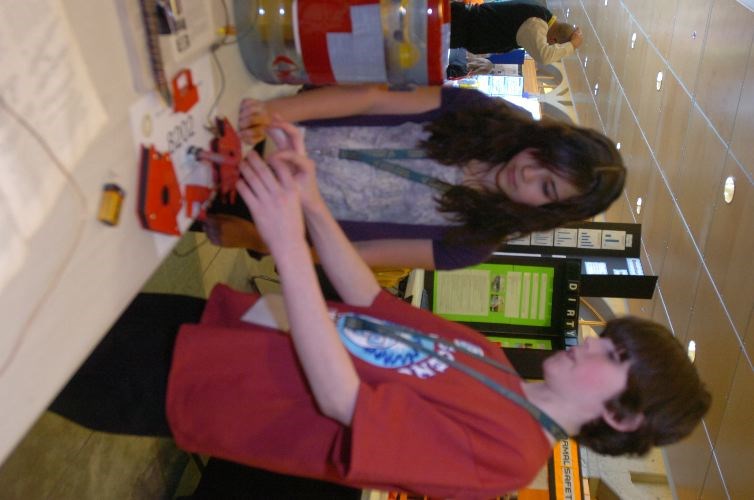From developing better turbine generators for backyard applications to testing if apricot pits can be used to destroy cancer cells, 142 young minds converged on UNBC Saturday for the 36th annual Central Interior Science Exhibition (CIES).
The day-long event gave 12-year-old Travis Church a chance to unveil his Blades of Green Energy project, which involved him building and testing three different kinds of turbines.
"I have a great-uncle who lives in Cranbrook who started out heating and powering his own own home with his own homemade water turbine and now he's gone to Third World countries to build water turbines for them,"said Church, a Grade 6 student at Immaculate Conception school.
"This is completely renewable because we're not going to run out of water."
Church successfully proved his hypothesis that a blade with a larger surface area would produce more energy, but that energy efficiency decreases, the further the turbine blade is away from the axis of rotation.
"If you expand the size of the blade too much you get less energy because the turbine would have more weight," said Church. "The small one traps the water and propels it down. When you have a lot bigger circle to turn, the water just hits the paddle and falls off."
Using a hammer, nutcracker and coffee grinder, Emily O'Reilly, a Grade 9 student at College Heights secondary, made an apricot pit extract and took it to the UNBC lab, where she worked with biochemistry professors Chow Lee and Conan Ma to determine the extract indeed has a toxic effect on cancer cells.
"My grandfather immigrated here from a small village in Croatia and he said that when someone in his village had stomach cancer, the word went viral and everyone saved apricot pits for that person, who ingested them and it was found it prolonged their life and reduced the pain," said O'Reilly.
The cancer cells O'Reilly used were cervical cancer cells obtained from Henrietta Lacks, an African-American woman who died from the disease in 1951. The HeLa cells were taken from her tumour before she died, and it was discovered they could be kept alive and grown. HeLa cells are now mailed to medical researchers around the world, including scientists at UNBC.
O'Reilly would like to continue her science fair study and inject laetrile (vitamin B17), the active ingredient in the apricot extract, directly into malignant cancer tumours and test the substance on other cancer agents.
Students from three school districts -- Prince George, Vanderhoof and Quesnel -- participated in the CIES, with a chance to qualify for the Canada-wide science fair in Toronto. They found ways to repel maggots by covering them with substances to stop their spread, they outlined the connection between smoking and bone degeneration, and they found out apple juice and cola soft drinks are not good for your teeth.
Cecil MacRae's Concussion Caper found there are no conclusive studies to determine whether padding would protect soccer players from concussions as a result of using their heads to redirect the ball. The 11-year-old soccer player, a Grade 6 student at College Heights elementary, has seen a few of his teammates injured that way and just wanted to know if those injuries were preventable.
Felicia Brooks, a Grade 7 student at Evelyn Dickson elementary in Vanderhoof tested four different types of wood to determine thermally modified (heat dried) wood is least resistant to the fading effects of sunlight -- better than pine, cedar and pressure-treated wood. Her uncle in Abbotsford makes thermally-modified decking materials and is very interested in the results of her study.
Brooke Tower and Aimee Alspaugh, Grade 8 and 9 students at Cedars Christian school, teamed up for an ongoing study that will determine if there's enough demand for biofuel diesel made from recycled vegetable oil and whether it's feasible to set up a co-operative association for collection of the oil and distribution of the diesel fuel made from that oil.
They identified at least 100 potential residential customers in the regional district of Fraser Fort George who don't have hydroelectric power and depend on diesel generators for heat and power and targeted Prince George restaurants as a source of discarded vegetable oil that now ends up in landfills.
"We know there's enough vegetable oil to actually make biodiesel fuel in Prince George, now we have to take it a step further to see if people would want to be members of a co-op," said Tower.



